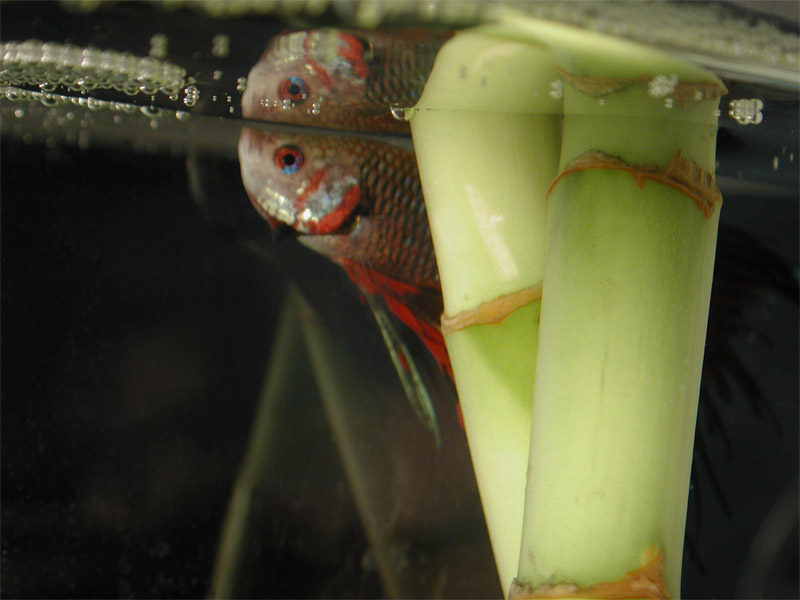My betta won’t eat flake food. He sucks it up and then spits it out again. What do you recommend? Should I try buying pellet food instead?
A: Sometimes bettas will suck up food and spit it out again to break it up. Observe your betta to see if he is eating the food after breaking it up. Disinterest in flake or pellet foods can occur because Bettas don’t always recognize the flakes as food. Usually breeders prefer to feed live foods to promote rapid growth and strength in their stock, so new Bettas may have never seen flakes before being purchased. In nature, bettas eat wiggly worms and insect larvae whose movement is an attractive lure to them.
Being consistent with feedings can help your picky eater learn to recognize the flakes as food. Try feeding just the flakes for a few days. Eventually, your Betta will realize that those funny floating wafers are nutritious and delicious. If after three days, he is still turning his nose up at the flakes, you may want to consider something else. Few Bettas can resist live and frozen fish foods like live black worms, white worms or grindal worms. Black worms can often be found at ma & pa local fish stores. Worm cultures, like white worms, can be purchased online or through local aquarium clubs. An easy alternative to live foods are frozen. Reputable brands like Hikari and San Francisco Bay Brand are free from bacteria and parasites and can be purchased at most local fish stores including PetSmart and PetCo. Try bloodworms, brine shrimp, mysis shrimp or beef heart. A combination frozen fish food offers a balanced diet and are usually consumed with gusto.

Beef heart is a great food for Discus; but, I would not recommend it for Betta because they will likely choke on it. Beef heart is tough (like steak), does not readily break down into smaller bits and can lodge in their mouth causing them to suffocate.
I am not too fond of the pellets either as they are dry and compressed. After the fish ingests them, they expand making it too easy to over-feed.
I suggest soaking a couple first to gauge the actual quantity of food comprising the pellet; you may find one at a time is enough.
Flakes along with dried, frozen or fresh blood worms would be a safer choice.
When fresh worms are available, I suggest “blood worms” (red worms) as opposed to the tubiflex worms because tubiflex can be unhealthy; depending on how they were kept and what they were fed. Frozen or dried tubiflex worms are okay to feed.
Brine shrimp are a poor choice for any small fish because of the sharp point of the tail shell, which does not hurt the larger fish.
Remember the fish’s stomach is only as big as it’s eye.
Feeding a smaller amount 2-3 times a day is a healthier way to feed your Betta.
At least once a week, it is good to let them fast to help prevent bloat.
I had same problem with new Betta. Just bought Atison’s Betta Pro and he’s a happy chappy at last!
My betta will not eat anything. He hasn’t eaten for 3 days now. the water if perfect temp for him. He is so active and healthy. I see no bloating or scales being raised. He doesnt have ick. But every now and then, he will freeze. Like stop swimming period and just look like he’s dangling from a string, when he does this he’s pointed up at the surface. I have tried flakes, brine shrimp, blood worms, and pelets. He will not bite ! Help me please? I’ve had him for 5 months. I change his water every saturday, he lives in a 1 gal tank, and I am going to upgrade him to a 3 gal tank soon. Maybe even a 5 gal.